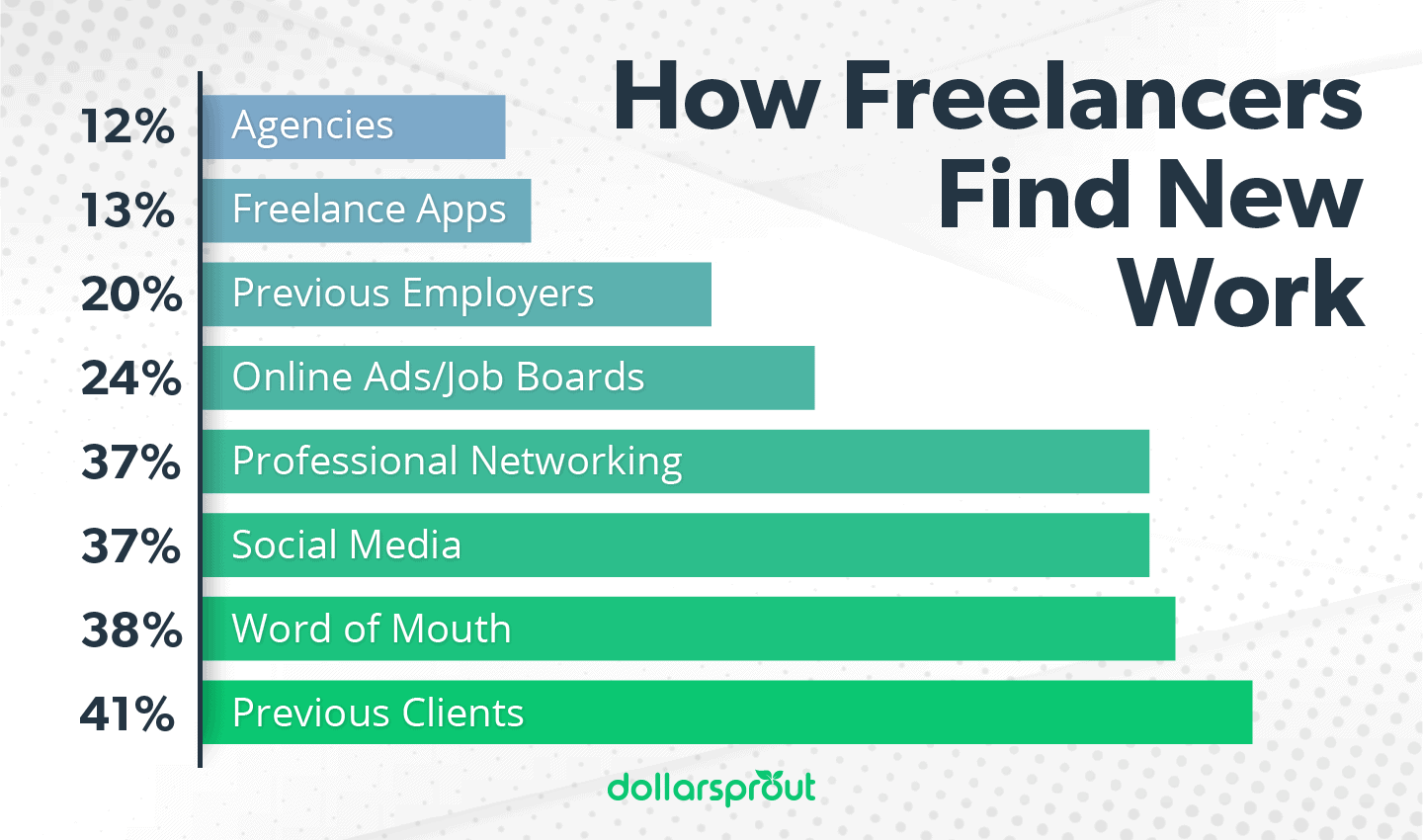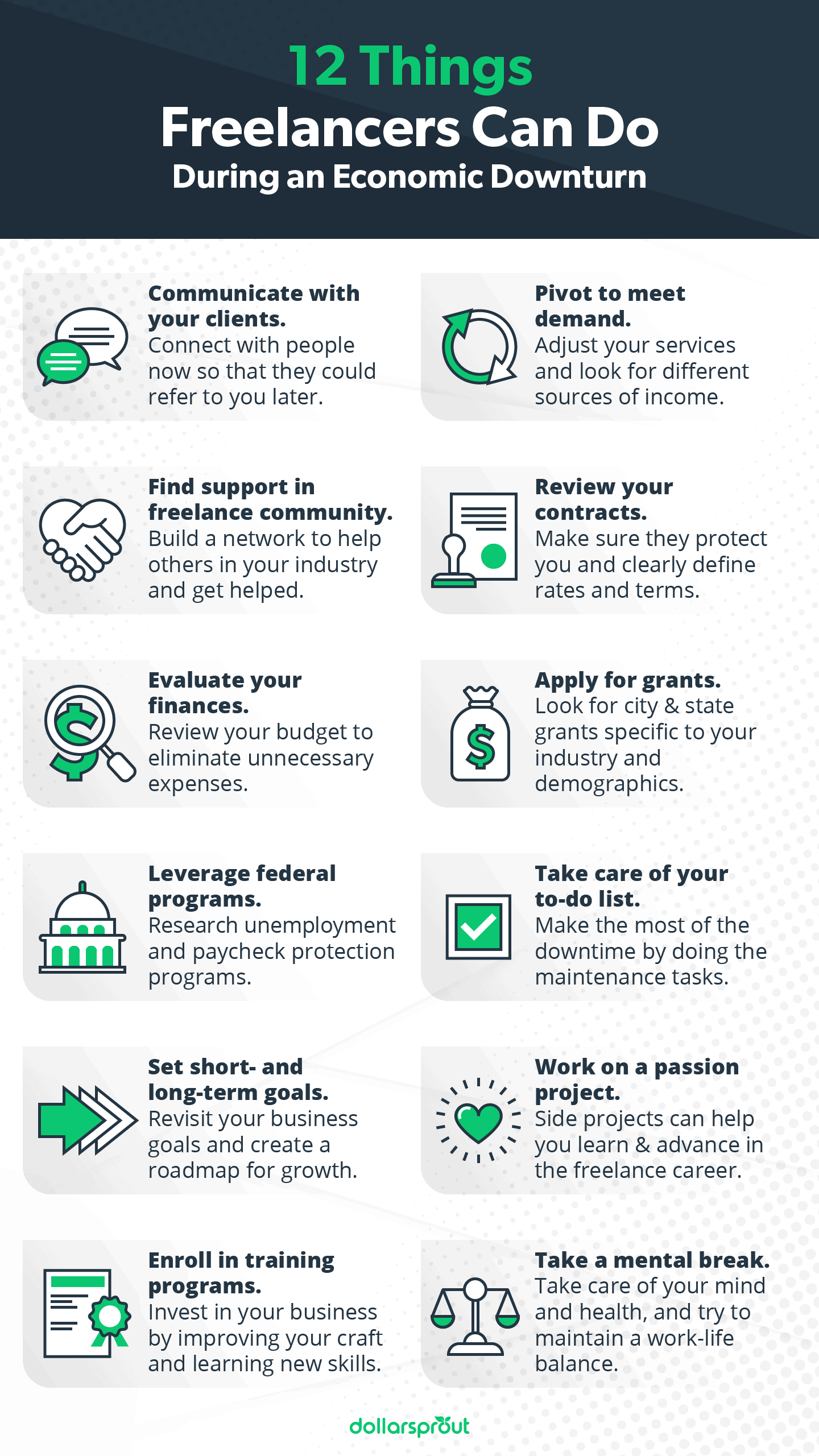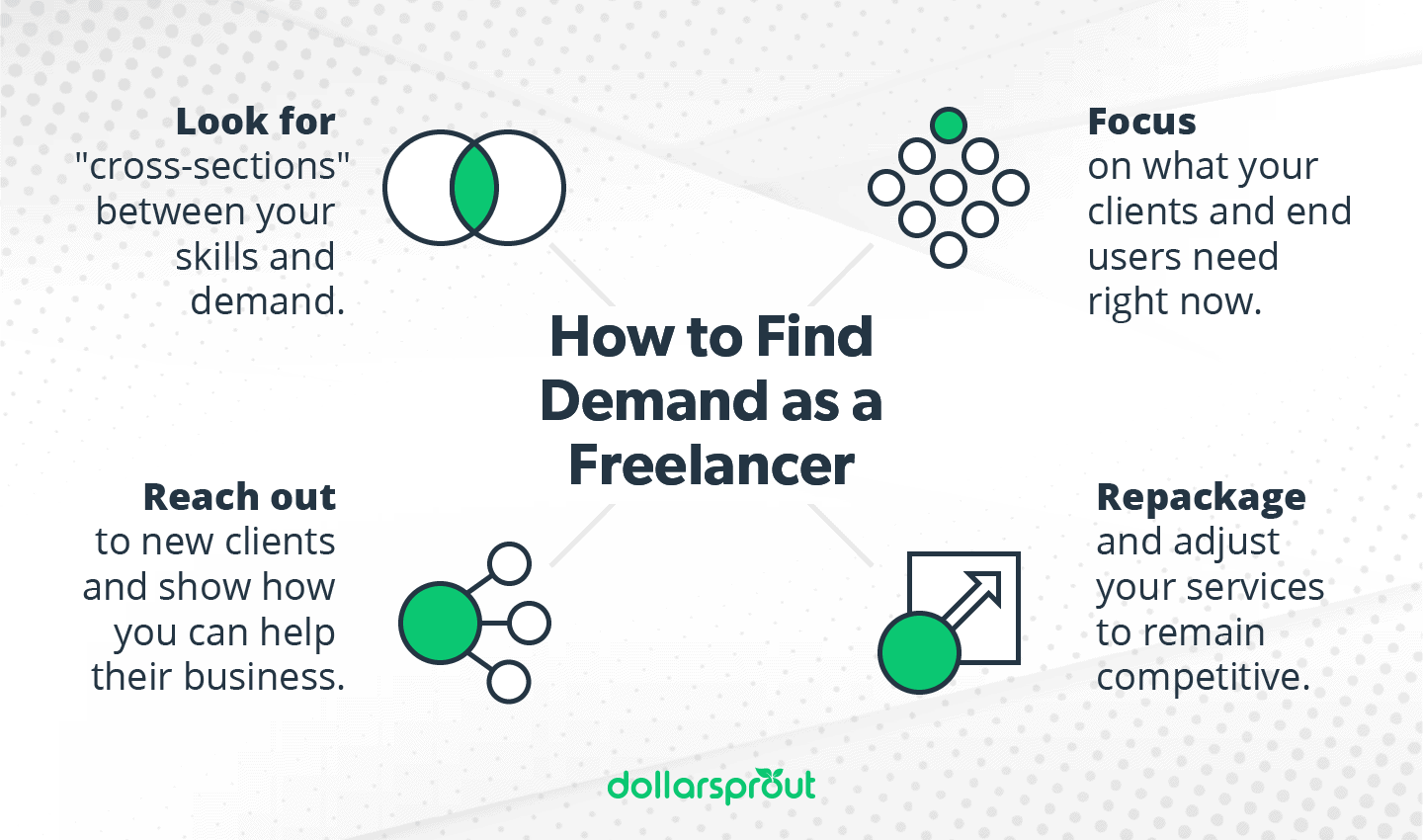12 Steps Freelancers Should Take During the Pandemic
Our readers always come first
The content on DollarSprout includes links to our advertising partners. When you read our content and click on one of our partners’ links, and then decide to complete an offer — whether it’s downloading an app, opening an account, or some other action — we may earn a commission from that advertiser, at no extra cost to you.
Our ultimate goal is to educate and inform, not lure you into signing up for certain offers. Compensation from our partners may impact what products we cover and where they appear on the site, but does not have any impact on the objectivity of our reviews or advice.
There are still ways to build a community, find sources of income, and stay productive during the pandemic. Here are 12 steps you can take to manage the emotional impact and keep earning a living.

Some of the links on DollarSprout point to products or services from partners we trust. If you choose to make a purchase through one, we may earn a commission, which supports the ongoing maintenance and improvement of our site at no additional cost to you. Learn more.
As the COVID-19 pandemic sends shockwaves through the economy and forces big businesses to cut budgets, freelancers and other independent workers are feeling the squeeze as well.
Freelancers make up 36% of the U.S. workforce and contribute $1 trillion to the national economy.[1] But some are dealing with less work right now while others are working overtime to keep up with new demand. And on top of an uncertain financial future, some freelancers might be struggling with isolation and anxiety.
12 Things Freelancers Can Do During The Coronavirus
There are still ways to build a community, find sources of income, and stay productive during the pandemic. Here are 12 steps you can take to manage the emotional impact and keep earning a living.
1. Communicate with your clients.
Reaching out to current and prospective clients with a professional, empathetic tone can put them at ease in the face of uncertainty. When you contact those clients, ask about scheduling a phone call to discuss their concerns or needs. These small gestures can go a long way now and after the crisis passes.
“Many experts predict that post-COVID-19 freelance work is going to be even more in demand,” says Andi Smiles, a small business financial consultant. “Connecting with people now means that they could refer to you later.”
To prepare, consider creating some of these resources:
- A page on your website explaining your pay rates and services.
- Another page detailing how you’re handling change during the pandemic and any new services you’re offering.
- Social media posts that help clients understand how you’re handling the crisis—and why you’re the best go-to freelancer to contact.
- Email templates to send to new and existing clients.
Hang on to these resources, and document how you handled issues throughout the pandemic so you’ll be better prepared for future crises when they arise.
Related: 50 Sites to Find Your Next Freelance Gig
2. Pivot to meet demand.
Freelancers are natural adapters, but COVID-19 may be pushing you to work even harder. If some clients have stopped sending you work altogether, you may need to find different sources of income or adjust your services.
Jackie Lam, a freelance writer and financial coach for artists and creatives, offers these tips:
- Look for ‘cross-sections.’ That’s the intersection between your skills and what’s in demand. For example, a pet sitter with relationship-building skills can pivot to delivering groceries and other items to her clients.
- Focus on what’s in demand. What do your clients and their end users need right now? This will be specific to your industry, so you can reach out to your network for ideas or do your own research.
- Repackage your services. Go over your full suit of services and think about how you can adjust them to remain competitive.
- Reach out to new clients. Send them an email, reach out via social media, or ask a colleague to make an introduction. Explain how you think your services can help their business.
Logan Allec, a CPA and founder of personal finance blog Money Done Right, noticed a shift in demand for his services during the pandemic.
“I’m a financial expert,” Allec says, “but during COVID-19, people aren’t worried about their taxes. They were worried about unemployment and stimulus checks and things like that.”
He began creating YouTube videos to help people understand how COVID-19 affects their money and how to get financial help. “I ended up making over $30,000 in YouTube ad revenue in April alone, excluding affiliates,” he says.
Related: 21 Inexpensive or Free Ways to Market Your Small Business
3. Find support in your freelance community.
Even if you thrive working from home without co-workers, it’s important to build a network with others in your industry.
“Colleagues are there to help you maintain your sanity, provide guidance if you’re struggling with some aspect of your business, and point toward promising work leads,” Lam says. And if you’re lucky enough to have a mentor, “they can help you define your values and drum up a game plan to achieve your business goals.”
Your community is especially important during crises like the COVID-19 pandemic. “People remember the people who helped them and made them feel better during a scary time,” Allec says. “Be there for people right now even if there’s no immediate return, and you could forge relationships that could become extremely mutually beneficial when things pick up again.”
You can establish these business relationships through social media groups, virtual meetups with local business owners, and freelance friends. Conferences also offer a great way to meet colleagues—although in-person events may be on hold.
4. Review your contracts.
Long-term contracts between freelancers and clients typically protect the client rather than the freelancer. Clients might cut budgets during tough times, but they shouldn’t ghost you when it comes to paying invoices and honoring retainer contracts.
It’s critical to have a contract that protects you and clearly defines the scope of work, rates, and payment terms. This can help you pursue legal action if a client doesn’t pay up.
Go through your contracts or create a new template, if you don’t have one already. An attorney who specializes in freelance work can help, or you can check out the Freelancers Union’s free contract creator.
5. Evaluate your finances.

Now is a good time to review your budget and eliminate unnecessary expenses. Go through your business transactions from the last three to six months and consider ditching services and products you don’t use or that won’t help you earn money.
You also might want to check on your personal finances, too. If you don’t know where to start, reach out to a nonprofit credit counselor. For example, GreenPath Financial Wellness and the Association of Independent Workers, two national nonprofits, have teamed up to offer free services for independent workers during the pandemic.
6. Apply for grants.
A grant is money that you apply for but don’t have to repay—which can be a lifesaver if your income has taken a hit.
To start, look for grants for freelancers within your city or state or ones that are specific to your industry. Some grants align with your demographics, too. For example, some are geared toward women or people of color.
Smiles recommends getting specific: “Freelancer grants are very competitive, and the general funds are exhausted quickly. The more nuanced you get, the better chance you have of receiving a grant.”
7. Leverage federal programs.
In the past, independent workers couldn’t apply for unemployment insurance benefits. But “pandemic unemployment assistance,” or PUP, expands these benefits to the self-employed.
“It can be a game changer for people’s financial security,” Smiles says. “The con is that you have to stay on top of the compliance requirements.” Look for details at your state’s unemployment website, and check whether you need to apply through PUP.
Your freelance business might also qualify for a federal loan or grant. Check out the Paycheck Protection Program or other resources through the Small Business Administration. An SBA office near your city may be able to give you more specific advice.
Related: 25 Programs to Get Free Money from the Government
8. Take care of items on your to-do list.
In the months leading up to the pandemic, you may have pushed certain tasks to the bottom of your to-do list; but now’s a great time to tackle them.
“If you’re facing a lull, think about how you can make the most of the downtime,” Lam says. “You might’ve been so busy with client work that you haven’t had a chance to revamp your website, or be consistent in posting to your social media channels.”
Some items to tackle on your to-do list might include:
- Responding to emails.
- Catching up on invoices.
- Updating your contacts.
- Networking with colleagues.
- Creating your website or developing new content for it.
- Making a list of people you’d like to work with or projects you’d like to do.
Related: How to Make More Money as a Freelance Writer
9. Set short- and long-term goals
Although it’s satisfying to check off your to-do list items, it’s also important to revamp and revisit your business goals. Smiles advises also using this time to create a roadmap for setting or achieving long-term goals.
Those long-term goals may include:
- Growing your business and hiring people.
- Brainstorming long-term projects, like hosting workshops or events.
- Developing a social media strategy.
Don’t forget to set short-term goals as well. These might include increasing your rates, renegotiating a contract with a high-paying client, or offering a new service.
10. Work on a passion project.
A passion project is typically a creative side project that excites and inspires you. Maybe you’ve always wanted to write a book, create a podcast, or start a charity. And if you lacked the time or energy to put toward your project in the past, you might have all the time in the world now.
Even if the passion project isn’t related to your work, it may still help advance your freelance career. These projects can demonstrate your full capabilities, expand your skill set, and provide a new platform for different work. “You’re also telling clients, ‘Hey, this is what I’m about,’ or ‘This is my dream project. Look at what I can do,’” Lam says.
Get the ball rolling by defining your result or goal. Then plan out the steps, figure out if you need to get others involved, and set up a timeline. But remember: While the project might benefit your work, it should also make you happy.
11. Enroll in training programs.

If you aren’t earning income right now, Lam suggests carving out some time for self-improvement. You can invest in your business by improving your craft, learning new skills, or simply chatting with seasoned freelancers.
You can do it on the cheap, too, as dozens of online courses are free right now. Earning a professional certification is another option. For example, a personal finance writer might check out Certified Financial Planner™ (CFP®) courses. Although you may have to spend money on the education program, the new designation can help you charge more for your services.
Related: The Best Online Writing Courses for New Freelance Writers
12. Take a mental break.
The coronavirus pandemic is causing a historic rise in mental health issues—and they’re only compounded if your income is taking a hit, too.
If you’re struggling, The Centers for Disease Control offers a few ways to manage stress:[2]
- Take breaks from the news if it’s making you feel anxious.
- Exercise regularly. Go for a walk or run, stretch, and meditate.
- Eat healthy meals and avoid alcohol.
- Get at least eight hours of sleep each night.
- Make time for activities you enjoy.
- Connect with others through video chats and phone calls.
You should also take regular breaks, set regular office or working hours, and stick to a routine. Work-life balance is important, even if your finances feel uncertain.
Taking care of yourself also means taking care of your mental health. If you need to speak with a professional, some therapists are offering virtual therapy sessions.
Related: Is Working from Home Bad for Your Mental Health?
Take Time to Consider Your Next Steps

If you’re feeling the mental and emotional effects of the pandemic, it’s OK to hit the pause button. These tips are a starting point for taking care of yourself and your business. During this time, you may choose to work on your business, get some rest, or do a combination of both.
But it doesn’t have to be an overwhelming process, Smiles says.
“You don’t have to make huge, sweeping changes to your business model,” she advises. “Even the act of questioning how you could improve your business will help you expand your offerings and income.”











